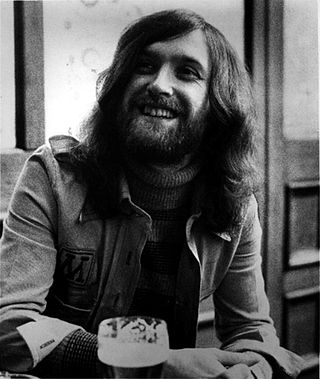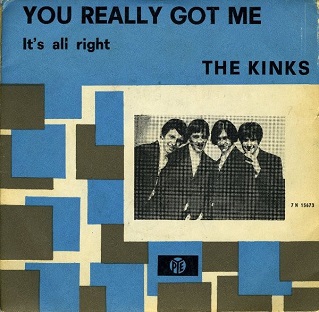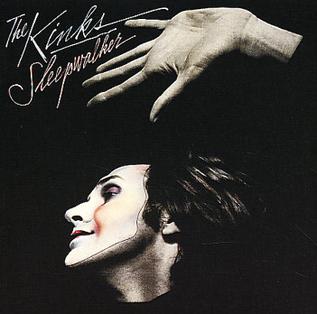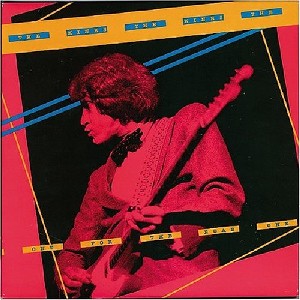
David Russell Gordon Davies is an English guitarist, singer and songwriter. He was the lead guitarist and backing vocalist for the English rock band the Kinks, which also featured his older brother Ray. Davies also sometimes undertook writing and/or lead vocals duties within the band, for example on songs such as "Death of a Clown", "Party Line", "Strangers" and "Rats". He has also embarked on a solo career, releasing several singles during the late 1960s and has since released eight solo albums.

"You Really Got Me" is a song by English rock band the Kinks, written by frontman Ray Davies. The song, originally performed in a more blues-oriented style, was inspired by artists such as Lead Belly and Big Bill Broonzy. Two versions were recorded, with the second performance used for the final single. Lead guitarist Dave Davies performs the song’s famous guitar solo. Although it was long rumoured that future Led Zeppelin guitarist Jimmy Page had performed the song's guitar solo, this has been debunked by Page himself.

"Lola" is a song by the English rock band the Kinks, written by frontman Ray Davies for their 1970 album Lola Versus Powerman and the Moneygoround, Part One. The song details a romantic encounter in a Soho bar between a young man and the eponymous Lola, who is possibly a trans woman or cross-dresser. In the song, the narrator describes his confusion towards Lola, who "walked like a woman but talked like a man", yet he remains infatuated with her.

The Kinks were an English rock band formed in London in 1963 by brothers Ray and Dave Davies. They are regarded as one of the most influential rock bands of the 1960s. The band emerged during the height of British rhythm and blues and Merseybeat, and were briefly part of the British Invasion of the United States until their touring ban in 1965. Their third single, the Ray Davies-penned "You Really Got Me", became an international hit, topping the charts in the United Kingdom and reaching the top 10 in the United States.

"Shangri-La" is a song written by Ray Davies of the Kinks. The song appeared on the 1969 concept album, Arthur. The song's inspiration can be traced back to when the band visited the Davies brothers' sister, Rose, and her family in Australia, the "designed community" that the family lived in serving as the initial lyrical inspiration. The song's highly ironic lyrics comment on British class society while portraying Arthur, the album's ill-fated protagonist, and his empty life in the suburbs. The musical aspects of the song both reflect and comment on the mood of the lyrics.

"Apeman" is a 1970 song by the English rock band the Kinks. It was written by Ray Davies and appears on the album Lola Versus Powerman and the Moneygoround, Part One. Written as a call to return to nature amidst the crowding and industry of the city, the song features calypso stylings. Like its predecessor, "Lola", it had to have a lyric re-dubbed for commercial release.

Come Dancing with The Kinks: The Best of 1977-1986 is a double album compilation by the Kinks, released on Arista Records in 1986. It contains thirteen tracks released as singles, only one of which did not also appear on album, and six album tracks. Every one of the band's seven albums released by Arista during the time period indicated is represented here. Designed specifically for the American market, it peaked at No. 159 on the Billboard 200 and failed to chart in the United Kingdom. A version for compact disc was issued in 2000 by Koch Records. Liner notes are by John Swenson, and the original recordings were produced by Ray Davies.

"Celluloid Heroes" is a song performed by the Kinks and written by their lead vocalist and principal songwriter, Ray Davies. It debuted on their 1972 album Everybody's in Show-Biz.

Low Budget is the eighteenth studio album by English rock group the Kinks, released in 1979. It was their first to feature bassist Jim Rodford who would remain with the group until their disbandment in 1996. Following the minor success of their 1978 album Misfits, the band recorded the majority of the album in New York rather than London. Unlike the more nostalgic themes of many Kinks albums prior to Low Budget, many of the album's songs allude to contemporaneous events. Musically, the album is a continuation of the band's "arena rock" phase, resulting in a more rock-based sound and more modern production techniques.

Sleepwalker is the sixteenth studio album by the English rock group, the Kinks, released in 1977. It marked a return to straight-ahead, self-contained rock songs after several years of concept albums. It is the first album in what critics usually call the "arena rock" phase of the group, in which more commercial and mainstream production techniques would be employed. The album also marks the last appearance of bassist John Dalton, who left the band during the recording sessions. Dalton plays bass on all songs on the album except for "Mr. Big Man". The lineup of the Kinks would be trimmed down significantly in 1977 following the album's release, as the brass section and backup singers were removed and the band returned to a standard rock band outfit.

One for the Road is a 1980 live album and video by the Kinks. It was released on 4 June 1980 on LP and cassette in the US, on video on 25 June 1980 in the US, and on 1 August 1980 in the UK.

"I'm Not Like Everybody Else" is a song written by Ray Davies and first recorded by the Kinks in 1966 and released that year as the B-side of "Sunny Afternoon". The lead vocal is sung by Dave Davies, with occasional parts vocalized by his brother Ray, the band's usual lead singer. The song is a defiant anthem of non-conformity. It has been covered by various artists, notably the Chocolate Watchband in their 1968 rendition of the song, and by Australian band Jimmy and the Boys, who covered it as their debut single in 1979.

"Come Dancing" is a 1982 song written by Ray Davies and performed by British rock group the Kinks on their 1983 album State of Confusion. The song was inspired by Davies' memories of his older sister, Rene, who died of a heart attack while dancing at a dance hall. The lyrics, sung from the perspective of an "East End barrow boy", are about the boy's sister going on dates at a local Palais dance hall.

"Catch Me Now I'm Falling" is a song written by Ray Davies and first released by The Kinks as the second track on their 1979 album Low Budget. Written as a criticism of America's allies, the song depicts the fall of Captain America as a symbol of the United States' dire circumstances at the time. The song features multiple solos on different instruments as well as a riff similar to "Jumpin' Jack Flash".

"Low Budget" is the sixth track from The Kinks' album of the same name. It was written, produced and sung by Ray Davies.

"Moving Pictures" is the final track on The Kinks' 1979 album Low Budget. Like the other ten tracks on the album, it was written by Ray Davies.

"A Rock 'n' Roll Fantasy" is the lead single and fourth track from The Kinks' 1978 album Misfits. Written by Ray Davies, the song was inspired by the band's then-tumultuous state at the time, with two members leaving the band during the recording of Misfits. Released as the first single from the album, the track was the band's most successful single in years, reaching number 30.

"She's Got Everything" is a song written by Ray Davies and released by English rock band the Kinks. It first appeared as the B-side of the Kinks' 1968 single, "Days".

"You Can't Stop the Music" is a song by the British rock band The Kinks. The song, appearing on the band's 1975 album Soap Opera, was written by the band's principal songwriter, Ray Davies.
"Attitude" is a song by the British rock band The Kinks, released on their album, Low Budget. It was written by Ray Davies.



















